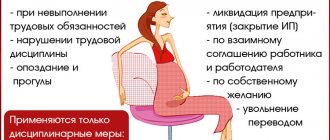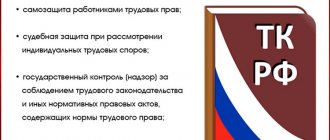Art. 173 Labor Code of the Russian Federation: questions and answers
Art. 173 of the Labor Code of the Russian Federation approves certain guarantees and compensation for employees who combine study with work duties. In ch. 26 of the Labor Code of the Russian Federation there are several similar articles that provide preferences for workers who are simultaneously studying. Art. 173 takes into account the interests of those who receive higher professional education.
Which categories of students are covered by the provisions of Articles 173–176 of the Labor Code of the Russian Federation?
What are the types of study leaves in accordance with Article 173 of the Labor Code?
Article 173 of the Labor Code of the Russian Federation
When is paid leave possible under Article 173 of the Labor Code of the Russian Federation?
When is leave for study under Art. 173 of the Labor Code of the Russian Federation is given, but without payment?
What should be the duration of leave in connection with studies under Article 173 of the Labor Code of the Russian Federation in 2020?
What other measures exist to support students under Art. 173 Labor Code of the Russian Federation?
What is the significance of state accreditation of an educational institution?
How are vacations processed under Article 173 of the Labor Code of the Russian Federation?
What to do if an employee gets sick while on vacation under Art. 173 Labor Code of the Russian Federation?
Can vacation under Art. 173 of the Labor Code of the Russian Federation to coincide in time with another vacation?
Can study leave be combined with another leave?
Leave for higher education
Study leave
All additional days off from work with their payment are calculated in working days of the calendar, not including days for legal rest and holidays.
Based on this, an employee of an enterprise who acquires a high degree of education in all forms of training and gives successful high levels of knowledge in mastering the program receives additional days off from work with full payment. The Labor Code and Article 173 make it possible to regulate the vacation study period, and this:
- Passing tests for a preliminary assessment of acquired knowledge in the initial 2 years of study - up to 40 days of the calendar.
- Preliminary assessment of knowledge in the 3rd year of study, as well as in upcoming courses and mastering the highest degree curriculum in a short period in the 2nd year of acquiring knowledge - up to 50 days of the calendar.
- Depending on the educational process, when passing tests for state assessment of knowledge (certification) - up to 120 calendar days.
Unpaid vacation days may also be received by employees who:
- Have received admission to entrance exams or are undergoing final certification tests at the department for preparing applicants - 15 calendar days.
- They are taking tests for an intermediate assessment of knowledge (certification) while studying full-time - 15 calendar days over 12 months.
- They carry out work to defend their thesis, and also pass state tests in the full-time education system - 120 days.
- They pass the final state exams, studying in absentia - 30 days.
If an employee of an enterprise receives a scientific, pedagogical qualification degree or residency training in absentia, based on Article 173 of the Labor Code of the Russian Federation, he can count on the following privileges:
- Every 12 months receive 30 paid vacation days at the place of your main job.
- Have a free working day once a week with payment at 50% of the monthly salary rate.
- The last year of study gives you the opportunity to receive 2 days off from your employer out of 5 working days, without paying them.
- Employees who are postgraduate students or receiving postgraduate education, as well as those acquiring a scientific degree with the defense of a dissertation, have the right to take advantage of 90 days of vacation with full payment.
https://youtu.be/rN6q9JdAth8
Which categories of students are covered by the provisions of Articles 173–176 of the Labor Code of the Russian Federation?
Legislative support for student workers is regulated by Art. 173, 173.1, 174, 176 (Article 175 repealed) Ch. 26 of the Labor Code of the Russian Federation, depending on the type of education:
- Art. 173 - for those receiving higher education and entering relevant university programs;
- Art. 173.1 - for those continuing higher education beyond standard programs, as well as those receiving an academic degree;
- Art. 174 - for those receiving secondary vocational education;
- Art. 176 - for workers mastering basic general education programs.
At the same time, in Chap. 26 of the Labor Code of the Russian Federation considers such types of educational process as:
- full-time education;
- part-time;
- correspondence
Guarantees and compensation vary depending on the type of training.
Work and study
Any working citizen receives a guaranteed right to study and receive higher, basic general, secondary and secondary vocational education. Enterprise managers, in turn, must fully fulfill their obligations and create all conditions for combining work and academic activities of the worker.
In order to be guaranteed to receive all required monetary compensation and security, a working student must:
- Gain knowledge at a state educational institution.
- Demonstrate success in learning.
- Receiving one or another level of education should not be repeated.
All rights apply to one educational institution, regardless of the number of educations that a working student wishes to receive.
To provide employees of enterprises with social rights and compliance with labor laws, the state Labor Code provides for various methods and methods, which are called guarantees. Also, a student worker can count on full state protection if his rights are violated. An employee receives monetary compensation in the event of a number of costs associated with acquiring knowledge or work activities.
All working students acquiring a secondary or higher degree of vocational education must be provided with the following:
- Additional academic or student vacation calendar days.
- Cash compensation for city transport costs for trips to an educational organization and return home.
- Reduction of working hours for 7 days.
https://youtu.be/L1UGNeagACQ
What are the types of study leaves in accordance with Article 173 of the Labor Code?
Leaves for educational process are divided into:
- Required:
- mandatory (which the employer must provide according to the Labor Code of the Russian Federation);
- optional (given by agreement with the employer).
- Upon payment:
- paid according to the Labor Code of the Russian Federation;
- unpaid according to the Labor Code of the Russian Federation;
- paid by decision of the employer (for example, established in an employment or collective agreement).
- Duration, depending on:
- type of educational process (full-time, correspondence);
- assignment of leave (for passing entrance exams, intermediate certification, preparing a diploma project, etc.).
Vacation registration
When applying for a study leave period, the employee must:
- Write the application by hand in accordance with the established template.
- Provide management with a letter of employment from the educational institution.
The management of the enterprise must consider the application and provide the employee with a study leave period, regardless of his length of service at this enterprise.
A calling certificate is issued to students who have demonstrated high academic abilities and is issued upon first request indicating the student’s last name, first name and patronymic, as well as the name of the enterprise where he works. The signature of the head of the educational institution is required.
Please note that the employee has the right to discuss the duration of study days off from work with the management of the enterprise and, by mutual agreement, increase them. This formality and its details are prescribed in the labor or collective agreement.
Statement
Application for study leave
An employee is not required to complete and submit an application for a study leave period. This fact is voluntary and can be formalized according to the wishes and needs of the employee.
If an employee refuses a training and vacation period, the management of the enterprise has the right not to provide it. It is also allowed to take part of the vacation days. Let's say an employee has the right to 14 vacation days, which are stated in the call certificate, but he can only use 5 vacation days.
In the case when an employee takes partial leave, in addition to basic documents, he must write an application with a detailed explanation of the request to the management of the enterprise. In it he makes the following points:
- A type of study leave, based on the information specified in the call certificate.
- Dates of leaving for vacation days and returning to the workplace.
- Terms of release from work.
Article 173 of the Labor Code of the Russian Federation
Article 173 of the Labor Code of the Russian Federation specifies guarantees for employees receiving higher education at the bachelor's, specialist, and master's levels.
According to Art. 173 of the Labor Code of the Russian Federation , in addition to the mandatory provision of vacations, including with the preservation of the average salary in certain cases, the Labor Code of the Russian Federation provides for some additional bonuses for successful students. For example, annual compensation for travel to and from the place of study.
The main purpose of Art. 173, as well as the entire chapter. 26 of the Labor Code of the Russian Federation - to support citizens who both work and improve their professional level through education. Indirectly, the content of the article also contributes to the implementation of state standardization of professions and an effective system of vocational education.
Read more about this in the article “Study leave under Article 173 of the Labor Code (nuances)” .
Non-compliance with labor standards
Employers of enterprises are required to bear responsibility for non-compliance with standards for the provision of educational leave days. This includes the following situations:
- In the event of circumstances in which, in accordance with the norms of the Labor Code, an employee is entitled to paid leave for the period of training, the employer is deprived of the right to withhold wages. In case of non-compliance with the rights of workers undergoing training, the enterprise will be subject to administrative liability and payment of fines established by the legislation of the Russian Federation. Temporary suspension of activities for up to 3 months is also possible.
- If an organization delays vacation payments to an employee, it will also be subject to penalties. In addition to the full amount of vacation funds, the company is obliged to pay the employee an interest rate on the amount of debt set by the central banking structure of the Russian Federation for each day of delay. Accruals are made starting from the next day after the established payment date until the delayed amounts are fully repaid.
It is worth noting that the absence of guilt of the organization’s management in delays in payments does not give the right to evade the return of interest.
Article 173 of the Labor Code gives every working citizen the right to receive education, combining work activity with acquiring knowledge. Having familiarized themselves with the contents of the article and the provision of legal guarantees and monetary compensation, many workers of the Russian Federation will not refuse to receive higher or secondary vocational education.
Top
Write your question in the form below
When is leave for study under Art. 173 of the Labor Code of the Russian Federation is given, but without payment?
The employer must give leave, but may not pay for it without additional agreement with the employee in the following cases:
- passing entrance exams;
- final certification upon completion of preparatory courses for admission;
- passing intermediate exams when moving from course to course during full-time study;
- passing the final certification and preparing a final project during full-time study.
These holidays may be granted to persons referred to in Art. 173 Labor Code of the Russian Federation. Payment for such leaves can be made by decision of the organization (for example, if it sent the employee to study on its own initiative).
What are the guarantees for students?
The provision of obligations by the employer and privileges for the student depend on the category of the student process: secondary general, primary general professional, secondary professional, higher special, postgraduate, as well as forms of study: day hospital, correspondence, evening.
Main types of programs:
- training of HR professionals and mid-level workers;
- obtaining a bachelor's, specialist's, master's diploma;
- completion of the educational process by scientific and teaching staff after university education;
- professional training of workers, specialists, their retraining, upgrading.
If the employer himself is the initiator of training for his employee, then he is obliged to fully reimburse all the latter’s costs for completing this training. So, if the courses are held in another city, then the manager is obliged to pay for a round-trip ticket, accommodation and meals for the employee.
Additional curricula:
- general, developmental and pre-professional;
- special programs that improve skills and qualifications.
To comply with compensation obligations, the following requirements are provided:
- An educational organization must have state accreditation.
- The student's learning process is successful.
- Getting a diploma for the first time.
The norms of Articles 173, 174, 176, 177 of the Labor Code of the Russian Federation ensure the protection of the rights of citizens who study on the job. If a student undergoes the educational process in parallel in two educational organizations, payments occur only in one. Payments are compensated only if there is a call to study of a specific type.
Article 173 of the Labor Code guarantees reimbursement of expenses for students who work and study in a master’s program in a “specialist” or “bachelor” program. The comments explain the provision of paid and free student days.
By agreement with the manager, you can combine vacation time with regular paid rest. The organization is obliged to reimburse once a year the cost of tickets for travel to the place of classes, establish shortened working hours throughout the day or week.
Obtaining education through correspondence or evening courses at institutions of the highest category is the most popular because it allows you to study while working in production.
For employees at the enterprise, a shortened week of 7 hours is established before national tests for 10 months to prepare pre-diploma work upon graduation. An agreement can also be drawn up to allocate one day off. The organization is obliged to pay at least 50% of the official salary or average monthly salary, but not less than the minimum wage.
What other measures exist to support students under Art. 173 Labor Code of the Russian Federation?
For absentee students, the employer must pay for travel to and from the place of study once a year. But in Art. 173 there is a condition: for those who successfully complete the program. How to determine success is not specified. According to established practice, if an employee has passed previous certification tests, continues his studies and presents a certificate from the university about the next session, his studies can be considered successful.
For part-time and part-time students in the last 10 months of study (before the final certification), the employer can provide a shortened working week. To do this, the student only needs to express such a desire (in writing). The working week can be reduced by a maximum of 7 hours with payment for these hours in the amount of 50% of earnings. In this case, the amount of earnings taken into account should not be lower than the established minimum wage.
The reduction can be expressed:
- in providing a free day a week;
- reducing working hours during the week.
Reduced working hours
All working citizens undergoing training in state institutions to obtain higher and secondary professional education in all forms of education are entitled to reduced working hours during the working week.
This benefit is provided for 10 months before the start of the final state certification. The working week is reduced by 7-8 hours, at the request of the employee, which is stated in writing and submitted to the employer for consideration.
An employee has the right to choose 1 full working day of release or reduce several working days by several hours.
During the period of release from work, such employees receive monetary compensation in the amount of 50% of the average wage, but not less than the established minimum wage.
How are vacations processed under Article 173 of the Labor Code of the Russian Federation?
Leave is issued on the basis of a written request from the employee, supplemented by a certificate of invitation from the university where he studies and a document on state accreditation of the university.
If the decision on leave is positive, the employer issues a corresponding order, which sets out the conditions and dates of the leave.
You will learn about the order form from the article .
The shortened working week provided to correspondence workers is also formalized by order.
The provided compensation for travel to and from the place of study is made after the student worker presents travel documents (tickets).
Paid additional holidays
For study leave, Article 173 of the Labor Code provides for payment only if the employee studies successfully. If a student has debts in subjects, then he can only go on unpaid leave.
Payment for educational leave provides for the preservation of the average monthly salary that the employee usually receives (that is, in fact, as regular annual leave). Such vacation pay is paid 3 days (or earlier) before the start of the vacation period.
When an employee passes the final certification (preparing for the State Standards exam or writing a thesis), he will be entitled to a vacation of up to 4 months. The exact duration is determined by the curriculum of each specific educational institution.
If an employee passes regular sessions, then he should be given paid leave according to the following principle:
- 40 days annually during studies in the 1st and 2nd courses;
- if the form of study is shortened, then in the second year they are provided with 50 days of rest;
- All subsequent courses will be provided annually for 50 days.
The total duration of all sessions is calculated. If their duration is longer, then the employee must take additional unpaid days.
It should be clarified that the student may not take advantage of such a right at all - this is not his responsibility. In addition, it should be additionally taken into account that if an employee initially writes an application for this type of vacation, but then does not submit a call for a session, then he will not only have to return the money paid, but also the manager will have the right to fire him for absenteeism.
The same applies to situations if an employee takes leave to write a diploma or undergo state certification, but ultimately does not pass for some reason (does not receive a diploma). They won’t be able to fire him for absenteeism, but they can demand his money back.
When calculating the average salary, which is taken as the basis for vacation pay, earnings from the beginning of the calendar year (from January) are taken into account.
If in other cases the full actual year is taken, then the rules are different here. Otherwise, vacation pay is calculated according to the same principle. Also, contributions to all funds (Pension Fund, Social Insurance Fund) will be deducted from this amount.
The main disputes arise regarding the timing of these payments. The reason is that usually, according to the Labor Code, vacation pay must be issued three days before the start of the vacation period. In this case, confirmation of the right to receive this money is an official call from the university for the session. But it is not always possible to provide such a document in advance.
In this case, the legislative norms should be understood as follows: the management of the enterprise is indeed obliged to issue funds in full 3 days before the vacation. But if the employee does not submit a call before the end of the session, then the payment is considered invalid - the employer has the right to withhold this amount in full.
Leave without pay
It is not always possible for an employee to receive payment for his rest time, even if it is related to study. For example, you can get unpaid additional leave according to the following principle:
- 15 days during the entrance exams. Even if the employee does not act, this will not be considered any violation of the article.
- In the same way, employees who took preparatory courses for entering a university and now need time to pass the final exams can receive 15 days of rest. We are talking about those cases when, based on the results of such tests, people are enrolled in a university.
- If an employee is a full-time student, then he is entitled to 15 days annually and another 4 months to write a diploma (or 1 month to pass state exams). In this case, these days are provided additionally, in addition to the required paid ones.
The legislative framework
Today, it is possible and even necessary for university students to combine work, because the amounts of scholarships are extremely low. Sometimes it is appropriate to work and study part-time or part-time. But what about vacation?
After all, training involves taking time away from work for a while for various purposes:
- listen to a lecture;
- pass the session;
- complete the internship.
Let's turn to the Labor Code; it contains Article 173, which not only guarantees that such an employee will not be fired, but also provides compensation for two categories of citizens:
- aimed at training from the employer;
- those who entered the university on their own.
An additional plus is if the employee is trained successfully.
Particular attention should be paid to the fact that Article 173 of the Labor Code of the Russian Federation provides for the presence of two types of universities:
- having state accreditation;
- not having state accreditation.
The law applies to citizens studying in two categories of universities.
It is important to understand that employees who choose an educational institution without state accreditation should take into account the guarantees and terms of the vacation provided in the employment contract. In this case, there will be no unclear issues during employment.
The Labor Code clearly regulates compensation and guarantees for workers combining work and study at universities with state accreditation.
Basic provisions
State accreditation requires a certain number of days to pass exams and study.
When gaining knowledge on programs:
- master's degrees;
- bachelor's degree;
- specialty
When studying part-time or part-time, the employer is obliged to provide the employee with additional days for vacation in full.
Depending on the course of study, vacation is distributed as follows:
| Interim certification of 1st and 2nd courses | 40 days |
| Interim certification of the 2nd year in the accelerated training program | 50 days |
| Interim certification in senior courses | 50 additional days |
| final examination | in accordance with the educational plan, can reach 4 calendar months |
In this case, during the certification period, the employee’s salary must be maintained. In some situations, wages are not maintained during the training period, but job security is guaranteed.
Such cases include:
| Passing entrance exams | up to 15 days of vacation |
| Listening to lectures to prepare for the final exam | 15 days |
| Passing final exams | one month |
| If the final exams are accompanied by a thesis defense | up to four months |
An educational institution with state accreditation may be located in another locality. The article obliges the employer to pay employees who combine work and study once a year for travel to the locality where the educational institution is located, as well as to the other end.
Another advantage for citizen students is that they are given more free time in the months leading up to their final exams. The maximum preparation period does not exceed 10 months.
Providing extra hours for study is calculated in several ways:
- is shortened every working day by a certain amount of time;
- The work week is shortened by a certain number of days.
This issue is resolved individually at the workplace. The agreement must suit both parties. Wages for this period are also calculated especially.
For hours from which the employee is exempt, the employer must pay half of the salary. The resulting amount must be higher than the minimum earnings for the specified year or equal to it.
It is believed that the employer is interested in improving the qualifications of his employee.
What are guarantees and compensation
Guarantees are enshrined in labor law; they are presented in the form of conditions and means that ensure the preservation and enforcement of workers’ rights.
Standardly divided into:
- intangible;
- material.
In this case, compensation for the payment of wages acts as guarantees. The employee is forced to miss days of service for a valid reason, which is provided for by law.
In addition, the citizen retains his job, despite the fact that he is forced to be absent for a long time in connection with passing the interim and final certification.
As for the concepts of guarantees and compensation, detailed information about them can also be found in the Labor Code, in Article 164. All these guarantees are described in the employment contract drawn up when applying for a job.
He can be:
- individual;
- collective.
Even if a citizen studies at an educational institution that does not have state accreditation, all guarantees can be specified in the contract on the basis of the Labor Code of the Russian Federation.
Let's also talk about compensation. This concept refers exclusively to material payments to citizens that compensate for the employee’s expenses.
If we talk specifically about Article 173, then the compensation here is one-time payments from the employer, compensating for the citizen’s travel in both directions. They are necessary if the educational institution is located far from the employee’s place of work.









